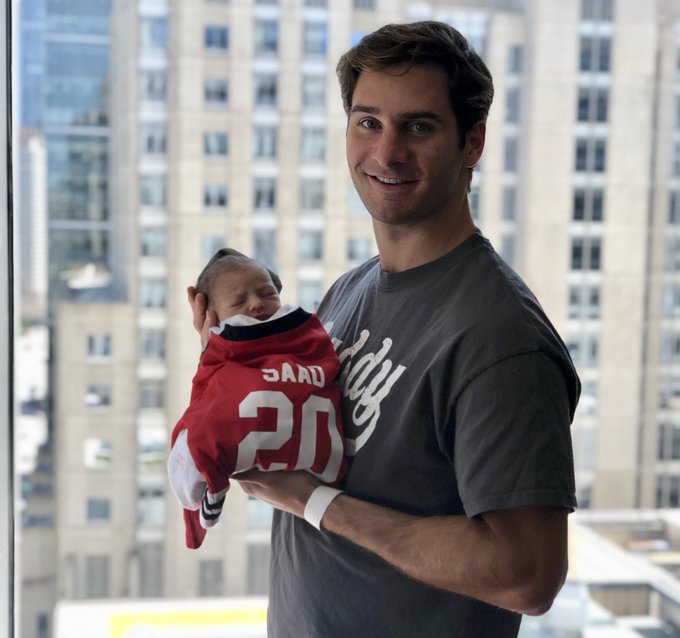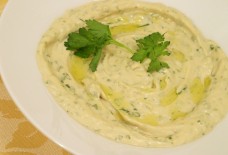Pathbreakers of Arab America--Seventh in Series: Brandon Saad

By: John Mason / Arab America Contributing Writer
This is the seventh in Arab America’s series on American pathbreakers of Arab descent. The series includes personalities from entertainment, business, science, academia, and politics, among other areas. Here, we highlight our seventh pathbreaker, Brandon Saad, Arab American, stellar national hockey league player, and proud descendant of an Assyrian Christian father who immigrated to America from Syria and an American mother. He has made a strong commitment to helping his Syrian relatives who fled to the U.S. due to the civil war in their homeland.
A Rare Breed—an Arab American Professional Hockey Player of High Esteem
Brandon Saad (سعد), born on October 27, 1992, in Pittsburgh, is a professional ice hockey forward with over a decade of play with several topflight American teams. He is currently with the St. Louis Blues, part of the National Hockey League (NHL). Brandon followed a typical pattern of recruitment, starting early as an amateur player. As a youth he played on the youth Pittsburgh Hornets team in the Quebec International Pee-Wee Hockey Tournament.
Saad began his amateur ice hockey career in the 2008–09 season with the Mahoning Valley Phantoms in northeast Ohio. He moved on to the USA Hockey National Team Development Program in the United States Hockey League. Brandon is credited with finishing the season with the most goals (12) and points (26) on the team. Still an amateur, Brandon transferred to the Canadian Hockey League during the 2010-11 season, playing with the Saginaw Spirit of the Ontario Hockey League.
Then Saad’s big leap to professional hockey came when he was selected by the Chicago Blackhawks in the second round, 43rd overall, of the 2011 NHL entry draft. He was a member of the Blackhawks when they won the Stanley Cup in 2013 and 2015. The Blackhawks then traded Brandon to the Columbus Blue Jackets before the 2015–16 NHL season. He played in Columbus for two seasons before the Blackhawks reacquired him in yet another trade before the 2017–18 NHL season. Saad was reassigned to the Spirit before moving back up to the Blackhawks. Such frequent moving of players up and down among NHL teams is common, being the name of the game.
Once Saad was recalled to the Blackhawks in 2012, he rejoined a team in the throes of the 2012 Stanley Cup playoffs. While the Blackhawks fell to the Phoenix Coyotes, Brandon skated on the left wing, scoring his first career NHL point with an assist on a goal that led his team to a 2-1 win. In the 2013 Stanley Cup playoffs against the Boston Bruins, he scored his first goal of the postseason in the second period to help lift the Blackhawks to a 4–3 win over the Bruins. With that win, Saad became the first Saginaw Spirit alum to win a Stanley Cup following the Blackhawks’ defeat of the Bruins in six games.
Saad continued his successful career with the Blackhawks, contributing to their victory in the 2015 Stanley Cup. However, Brandon and the team could not agree on a contract, at which point his negotiation rights were traded to the Columbus Blue Jackets. He signed a six-year contract extension with the Blue Jackets worth $36 million. During the 2015-16 season, Saad was voted into his first NHL All-Star Game on January 6.

Almost dizzyingly, Saad was traded back to the Chicago Blackhawks in 2017. There, Saad’s scored a hat trick, when a player in hockey scores three goals during the course of a single game. When a player scores the third goal it is tradition that fans will throw their hats onto the ice. Brandon also became the first Blackhawks player to get a hat trick in a season opener since one of hockey’s greatest players, Bobby Hull, way back in 1965.
Saad was traded again, in 2020, by the Blackhawks, this time to the Colorado Avalanche, then, as a free agent, he moved to the St. Louis Blues in 2021. He finished the regular season with 24 goals to help the Blues clinch a berth in the 2022 Stanley Cup playoffs. Brandon seems to have found a long-term NHL home with the Blues. Barring any unforeseen change of circumstances, he’ll remain in the Blues’ organization for at least four more seasons.
Saad’s commitment to helping his Syrian relatives adjust to life in the US after fleeing the civil war
Saad’s father, George, was only 18 when he immigrated to the U.S., in response to rumblings of civil war in Syria. Both father and son’s commitment has been to bring over as many of his relatives as he could. Brandon’s fathers side of the family are descendants of a long line of members of the Assyrian or Syriac Christian Church.

They are Christians and number about one million members living in the central Middle East, namely Iraq and Syria, with other members in an archdiocese in India and the diaspora. Showing its early Christian roots, the Assyrian Church uses a liturgical language known as classical Syriac, a dialect of eastern Aramaic. Ethnically, the people are descendants now known as Assyrian.
Brandon speaks of his family’s struggle in Syria as an “eye opener.” According to the Guardian, “No one needs to tell Brandon Saad that there are more important things in life than hockey. For the past few years, the Columbus Blue Jackets forward has watched as his relatives left war-torn Syria to make a safer life for themselves in the United States.”
Saad noted further, “It’s definitely an eye-opener with them coming over and getting adjusted to the lifestyle and the new language and things like that, …It definitely puts things in perspective for you.” He speaks “glowingly of the way his father’s hard work has served as an inspiration.” George received two degrees from Columbia and the University of Pittsburgh became a US citizen, and settled in Pittsburgh, where Saad was born. But many of George’s brothers and sisters were left behind in Syria, which descended into a civil war in 2011.
Fearing for the safety of their relatives back in Syria as the country descended into one of the largest humanitarian crises in recent memory, the U.S. Saads began the process of moving as many family members as possible to the U.S. “Most of them are over here now and the ones that aren’t here yet they’re safe back home,” says Saad.

Saad’s uncles and aunts now live in Pittsburgh near his family, which has made the transition easier. Saad says his father has been able to help them settle in, relying on his experiences from the time he was a newly arrived immigrant. Brandon has used his impressive NHL earnings to help out on the financial side by sponsoring some of his relatives.
“You try to help out as much as you can. My dad has worked hard to be successful so he can help them as well. But any way I can help I’m always here for them,” Saad says. “They know that. I’ve gotten pretty close with them over the short period of time.”
His Syrian family’s arrival has also been an opportunity for Saad to expose them to hockey, a sport they didn’t know much about. It’s been a bonding experience, as Saad had not met any of his relatives in person, and only got to know them over Skype, prior to their landing in Pittsburgh.
Sources:
–“Wikipedia List of Arab Americans—Brandon Saad,” 2023
–“The Columbus Blue Jackets forward has been helping his Syrian relatives adjust to life in the US after fleeing the civil war in their homeland,” The Guardian, 3/15/2016
John Mason, PhD., who focuses on Arab culture, society, and history, is the author of LEFT-HANDED IN AN ISLAMIC WORLD: An Anthropologist’s Journey into the Middle East, New Academia Publishing, 2017. He has taught at the University of Libya, Benghazi, Rennselaer Polytechnic Institute in New York, and the American University in Cairo; John served with the United Nations in Tripoli, Libya, and consulted extensively on socioeconomic and political development for USAID and the World Bank in 65 countries.
Check out our Blog here!









